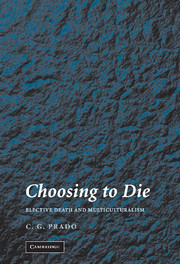Book contents
- Frontmatter
- Contents
- Preface
- 1 Setting the Stage
- 2 Criteria for Rational Suicide
- 3 Clarifying and Revising the Criteria
- 4 Application Issues
- 5 What Standards?
- 6 Relativism and Cross-Cultural Assessment
- 7 The Role of Religion
- 8 Assessment Latitude
- 9 The Realities of Cross-Cultural Assessment
- Works Cited
- Index
4 - Application Issues
Published online by Cambridge University Press: 05 June 2012
- Frontmatter
- Contents
- Preface
- 1 Setting the Stage
- 2 Criteria for Rational Suicide
- 3 Clarifying and Revising the Criteria
- 4 Application Issues
- 5 What Standards?
- 6 Relativism and Cross-Cultural Assessment
- 7 The Role of Religion
- 8 Assessment Latitude
- 9 The Realities of Cross-Cultural Assessment
- Works Cited
- Index
Summary
The impact of multiculturalism and relativism on assessment of the rationality of choosing to die has to do with the fundamental imperative to respect culturally diverse values. Doing so means that assessment of deliberation of elective death must accommodate culturally determined values that influence deliberation of preemptive suicide, surcease suicide, assisted suicide, and requested euthanasia — PS1, SS2, AS3, and RE4. The concern is that values may influence deliberation in problematic ways. The motives clause of the rationality criterion requires that for it to be rational, choosing to die must be “judged in cross-cultural dialogue not to override interest in survival unduly.” The clause's point is to guard against undue depreciation of interest in survival by cultural values shared by those choosing to die and those assessing their elective-death deliberations and decisions.
It will look to many as if the problem posed by the need to respect diverse cultural values in assessing elective-death decisions is not so much cultural values' unduly overriding interest in survival as those values' precluding elective death even when it best serves terminal patients. This is no doubt a serious problem and clearly poses difficulties for some terminal patients suffering greatly and wanting to die. However, in dealing with life and death issues, the priority must be the possible violation of the interest in survival rather than proscription of elective death.
- Type
- Chapter
- Information
- Choosing to DieElective Death and Multiculturalism, pp. 65 - 87Publisher: Cambridge University PressPrint publication year: 2008



